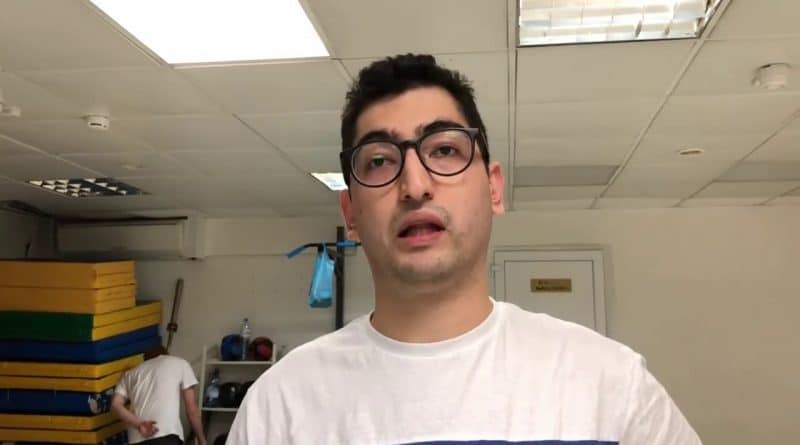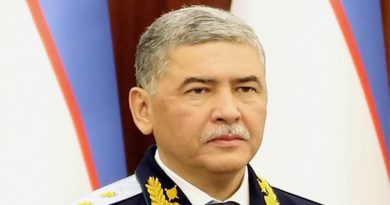Uzbekistan: blogger Bazarov was sentenced to three years of restriction of freedom
On January 21, the court found Miraziz Bazarov guilty under clause “г” [“d”] of part 3 of Article 139 of the Criminal Code of Uzbekistan (“Slander for mercenary or other vile motives), as a result: restriction of freedom for a period of three years, starting from the moment of house arrest – from April 29, 2021.
The two-day process was distinguished by indirect and direct evidence of the influence of the authorities and special services on the decision of judge Sardorbek Sadykov. Contrary to the opinion of lawyer Sergei Mayorov, on the first day of the hearing, the trial on January 21 was final. A reporter for the online media Hook.Report wrote that journalists from Hook and Repost were allowed into the courthouse. Their PCR tests and press IDs were photographed. Probably, maintaining a chronology by the Hook journalist was considered undesirable and, under the pretext of a mistake in her badge, she wasn’t allowed to the second part of the trial.
“The transience of the process is caused by the desire to get out of the focus of the international community as soon as possible,” the ACCA expert concludes.
Journalist Irina Matvienko and lawyer Alan Pashkovsky, in their posts on the social network, noted the violation by the judge of Article 10 of the Universal Declaration of Human Rights, which Uzbekistan ratified in 1991. It states that “everyone, in order to determine his/her rights and obligations and to establish the validity of the criminal charge against him/her, has the right, on the basis of full equality, to have his/her case heard publicly and with all the requirements of fairness by an independent and impartial court”.
Irina notes that in relation to criminal cases, this principle is enshrined in Article 19 of the Criminal Code of the Republic of Uzbekistan regarding open trial of cases in criminal courts. Detailed explanations are given in the Resolution of the plenum of the Supreme Court on ensuring an open trial and the right to receive information about the activities of the courts.
“There is no such reason to avoid pressure on the court.” And it doesn’t matter that the results became known the next day; it’s important that the judge couldn’t do that. The OSCE, the relevant UN structures, Delegation of the European Union in Uzbekistan, the Media Support Fund and the embassies seem to have silently accepted this situation. Not a single comment. As if nothing had happened,” the journalist is indignant.
By the way, ACCA wrote how the 23rd annual OSCE Central Asian Conference in Tashkent was held under the dictation of the authorities. In March 2021, the head of the board of trustees of the Public Foundation for the Support and Development of National Mass Media, Komil Allamjonov, called on “all media and bloggers to stop covering the topic of LGBT”, citing Miraziz as an example, who was unanimously called the defender of representatives of sexual minorities and youth subcultures by the Uzbek media. The Ministry of Internal Affairs posted a video showing Miraziz Bazarov as a provocateur. Deputies and politicians turned against the blogger.
The least talked about was that the now convicted who was one of the first in the media environment to raise the issue of spending borrowed funds from international financial organizations, writing an open letter to the IMF and ADB. It stated that loans issued by international organizations not only became a catalyst for an extraordinary increase in the level of corruption, but also hit the country’s business and economy. It was after the approval of loans from the IMF and ADB that the government of Uzbekistan strengthened quarantine measures, leaving a significant part of people without income and livelihood. As a result, a notice for a conversation was sent to the State Security Service, which at that time was actually headed by General Batyr Tursunov, the father of the eldest presidential son-in-law, Oybek Tursunov.
A convenient pretext for reprisal was the post of Miraziz, when he called for anime and K-pop lovers to gather in the center of the capital on March 28. No one came to the meeting, but a well-organized protest of supporters of traditional values took place in the center of Tashkent. They are with exclamations “Allah Akbar!” beaten two teenagers, mistaking them for “perverted” LGBT supporters. The security forces reacted unusually sluggishly to this. Late in the evening, Miraziz Bazarov was severely beaten by three people near his house. He received injuries to internal organs, an open leg fracture after being hit with a baseball bat, and a concussion.
Lawyer Sergei Mayorov openly stated that the attack was staged.
“At this trial, we repeatedly said and confirmed that it was the State Security Service that organized this beating, and they are looking for absolutely the wrong people who actually did it. And, of course, they are not looking for them,” the lawyer said. “The judge ignored death threats from activist bloggers of a certain ideological orientation.”
Bazarov told Radio Liberty in Uzbekistan that due to various slanderous information spread by these pro-government bloggers, he received hundreds of death threats against him from their subscribers. Law enforcement agencies ignored his appeals about threats. Three of them were recognized as victims of slander by Bazarov, who repeatedly declared that they were protected by the State Security Service and the Ministry of Internal Affairs.
An extensive base of evidence of the blogger’s guilt was provided by 28 statements from citizens, as well as a collective statement from the teaching staff of school No. 110 of Mirabad district demanding “to take legal measures” against Miraziz Bazarov.
“The lawyer, on behalf of his client, announced that he would seek to have the sentence overturned. However, given the history of persecution of the blogger by the authorities, this will be very problematic,” the ACCA expert sums up.




